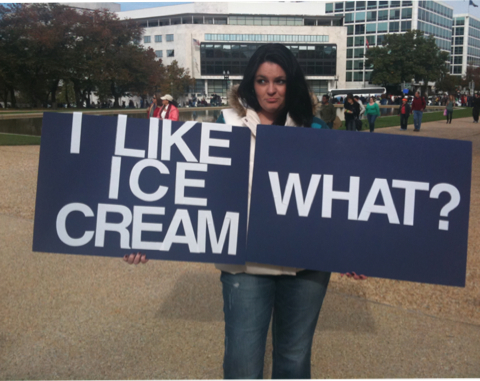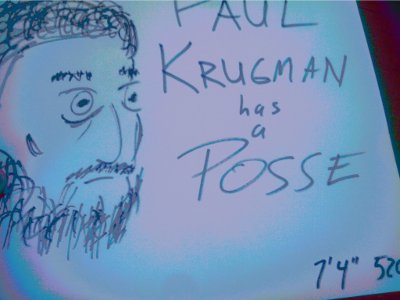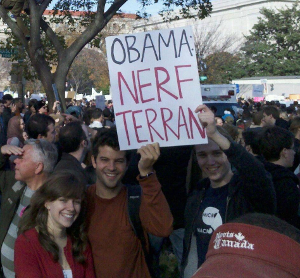A Magical Gathering
And by all, I mean at least 200,000 people. Funny story – Fox News went with an estimate of 60,000, but Fox’s own DC affiliate quoted at least 200,000 just based on the excess DC Metro traffic alone. If it were only 60,000 people, they each must have ridden the Metro at the Mall 8 times on Saturday. DC residents I talked to all confirmed that the attendance at this rally crushed attendance at Glen Beck’s rally.
Blocks of DC were packed with people all around the event. Comedy Central’s biggest mistake was underestimating the size of the crowd — the sound systems were woefully inadequate. A lot of the people there couldn’t hear much of what was said by the performers, or any of the musical guests, and “Louder! Louder!” was the most common chant in the crowd – you could hear it move around the rally as the limited speed of sound created phasing problems over the long distances involved. The Comedy Central website supposedly got hit by 4 million requests for the stream when it started.
But yeah, as somebody who was there, I can tell you this thing was a really big deal that touched the lives of a lot of people.
But focusing on that is the kind of sensationalism Stewart decries, so I’ll move on.
Hard times, not end times
The important takeaway is that the money finds its way downhill, and since there neither the political will for a strong federal government authority to police and counterbalance abuses, nor a framework for doing so that works within the constitution, nor an economically efficient model that does things any differently short of state-controlled media paired with a sovereign wealth fund and all that jazz — and since this coalition now controls the Supreme Court, is able to block any congressional or presidential priority it chooses to block through influence on both sides of the political aisle, is about to take more formal control of Congress (after which they will promptly nudge the Tea Parties that got them there out of meaningful policymaking circles), and will probably take control of the Presidency in 2012 due to nigh-limitless unregulated resources in an unprecedented surge in legal public corruption —
Well, because of all these things, the current dynamic with the press is probably going to keep working this way for a while. But, as Stewart said, “These are hard times, not end times.”
This problem isn’t really that urgent or that bad. It’s a meaningful problem, to be sure, but this wasn’t just him marshalling opposition to it. There is time. And hey, maybe it’s an economic or social trend that will be with us for a while. There is more you can do in relation to a problem than solve it. Reframing it and understanding it in new ways can be a powerful thing.
As far as I can tell, there is no totalitarian regime knocking down Jon Stewart’s door and making him stop. He just had an enormous show of force on the steps of the Capitol. The opposition Stewart presents isn’t really that threatening to the social order, and the social order doesn’t really threaten Stewart that much. That’s why we can all afford to be sane, and why it’s important to divorce this rally from other shows of force. It is such habit to think of these political events as thrusts in the direction of an immediate goal – this was an act of creation and an act of patience.
While it may appear as if Stewart is casting off the robe of satirist and becoming a pundit himself, he’s a still a satirist speaking truth to power. Maybe the ideas will germinate and create some sort of adjustment in attitudes or change down the line. That’s of course not what a satirist is, but it is a big part of what a satirist does — pursuing the idea, not the political objective. Acting as an artist first and a political person far afterward.
This is why, for example, some people still read “A Modest Proposal” in school (an essay by satirist Jonathan Swift about solving overpopulation and Malthusian poverty by eating babies), despite the fact that the explosive fecundity of the Irish is no longer a social problem of great perceived importance. It’s not just about what gets done around the issue – it’s about how we think about the issue.
And hey, really, the press isn’t that different from how it’s always worked. Stewart’s way of talking about it, his common sense approach and his attention to specificity, his particular take on journalistic integrity – these are rarer things that we might like to admit in this business. The popular press has long by one mechanism or another been controlled by wealthy private interests and used for the exercise of political power and corruption of the state. This is just the way they happen to be doing so now, and it’s just a little sad that we don’t get to exercise the willful ignorance of it that our parents and grandparents got to exercise. But hey, ignorance isn’t bliss, it’s just ignorance, right?
The information saturation and availability promoted by the Internet makes thinking about a lot of things in new ways not only possible, but necessary. The criticism Stewart is offering is of something that is perhaps newly apparent, but not new at its core, and structurally a big part of how media functions – Stewart himself is even part of it from time to time, which he appreciates and makes fun of, because he doesn’t take up the mantle of journalism that he so often accuses others of wearing falsely because he doesn’t want to be dishonest about something that is so important and elusive.
That’s a pretty complex relationship there — a lot of things Stewart is able to help us think about in how the dynamics of media play out these days. But yeah, it doesn’t solve the problem. The difference is how we think about it. When we choose to think about it – you know, when we have the time to think about it and are not like the mom with two kids in the car Stewart talks about who can’t really think about anything else right now.
Ad Absurdum
People wonder how this rally is appropriate for a comedian — is Jon Stewart no longer a comedian, but something else? Looking at the landscape of the problem and the absurdity of how he has approached talking about it, I come down very firmly on the side of the Rally to Restore Sanity and/or Fear being very much an art object and a comedic and satiric piece, and not a crossover political rally by a bunch of comedians.
It is absurd to rally 200,000 people on the national mall to a giant speech where you’re going to tell them to chill out and not worry too much. It’s absurd to get together a giant coalition to address a problem you don’t really think can be solved right away that’s very complex, to offer some platitudes and general principles around it but not use this giant group of people to do anything about it, and then have everybody go out drinking and to Halloween parties.
But absurdity serves a very important role in helping us think about and create meaning around problems. It helps us broaden our perspective around issues that are difficult to grasp. It’s like a Zen koan – that’s a great example of a concept that Western people generally grasp more easily by conceiving of it as foreign or exotic when really it’s quite common in their own culture – thinking about something that is incomprehensible in some way broadens your mind and makes it possible to think in a different way.
You don’t have to be serious while you’re doing it, and your end goal doesn’t have to be enlightenment. Pondering and articulating the absurdity of relationships and ways of thinking is an important mechanism in satire and social change in western societies as well. Pointing out the absurdity in a situation isn’t just about making fun of somebody or taking them down a peg. It’s about understanding complex relationships in a way that our usual discourse makes difficult.
By creating this rally, Stewart (and really everybody else involved in it, I’m speaking about his posse synechdochally), are challenging us to expand the way we think about discourse. But they also creatied a venue that the people attending the rally used to their own ends. And these ends were in many ways a lot more creative, insightful, complex and elucidating than the rally itself.
I’ll save some of that for my next entry, when I have more pictures compiled and can share the broader experience. For now, I’ll give you a bad picture of the poster I carried with me during the rally with my bad phone camera used poorly:
I’m not the world’s biggest Paul Krugman fan in the world (although his Nobel Prize winning economic work is awesome and legit, according to people I’ve talked to who know about that sort of thing – even if it doesn’t have much to do with the columns he writes for the New York Times), nor the biggest Shepard Fairey fan in the world, but I love a good “five percenter” joke (this one was probably more like one percent).
But I can’t really let any of this pass without mentioning the signs. The signs were so awesome – a big part of the entertainment of this event. A lot of them were political, but most of them weren’t – I’ve already conversed on Twitter with JessicaHusseinObama, or @vdaze, who made the “I LIKE ICE CREAM” sign:

I loved how so many signs at the rally stated things that were true - it was an intuitive but subtle play on how so much that is on rally signs is so obviously false.
And, I really loved how there were certain topics that seemed to be on a lot of people’s minds. One of the cool things about artistic events and festivals — and you could have easily thought of this whole event as a signmaking festival, as many people pointed out with signs that said such things as “GRAPHIC DESIGNERS FOR SANITY” or “I OWN STOCK IN A POSTER SUPPLY COMPANY” or the many “MY ARMS ARE GETTING TIRED” and “THIS IS A SIGN” signs. One topic that popped up on a few signs struck a chord with me:
Or




Tomorrow’s going to be a pretty epic day for ‘Merica.
And hey, really, the press isn’t that different from how it’s always worked.
You say this, but you spend the bulk of the article arguing against it. Which is where I make my chief objection. You talk about “dereliction of duty” and “pervasive malice and corruption” in the press. From this, I’d get the impression that journalism in the early 21st century in America is somehow distinctly different – in tone or motive – than journalism in the 20th, 19th or 18th centuries. None of my (admittedly cursory) knowledge of American history suggests that that’s the case.
The 24-hour news stream has changed the volume of journalism, perhaps. And when you crank the volume up high enough, even Vivaldi gets ugly. But I don’t know that you make the case that America has entered a New Era of Irresponsible Reporting. And I don’t think Stewart has made the case, either.
Yeah, it isn’t really that clear-cut. Certainly we can see developments taht happen in real time that show things getting worse than they might otherwise be. But it’s unclear how much of this is actually new and how much of it is just having a greater understanding of what was always there.
One of the important distinctions is that, even if the overall function, the high-level view, has similarities, the methodology is DEFINITELY new.
Like, Fox News is run by a Nixon strategist who has multiple presidential candidates directly on his payroll and shills for fundraisers during its news broadcasts. If GE has historically influenced NBC News to serve its interests, it didn’t do so in this manner – maybe calls were made that killed stories, maybe producers and executives had conflicts of interest.
And to the extent that news reports were stilted or falsified in the past, it seems from memory at least that they were done in a more consistent manner that paid more deference to an idea of a correspondence theory of truth – but again, cognitive dissonance may be playing a role there. It’s hard to say.
But it was unacceptable until very recently to claim on a major TV news outlet that the President of the United States is an enemy sleeper agent conspiring to conduct paramilitary attacks on his own people, which is fairly common in the whole “terrorist-question-mark” discourse.
So something has definitely changed. The money situation is certainly very bad — individual corporations didn’t used to have the political clout to run campaigns that changed state constitutions (consider the hysterical misinformation around this summer’s California Prop 16, which was all funded by one company through a series of intermediaries and heavily advertised through media outlets that didn’t balk at the rampant misinformation).
Things on par with the Watergate scandal are at this point fairly commonplace, because the technology has made it a lot easier to do things like make enemies lists, spy on political enemies, record clandestine communications and funnel money in and out of slush funds – and the more widely proliferation of information has made “cover ups” business as usual, to the point where it is less common for something to _not_ be covered up by a vaguely aligned private political organization than for it to be so.
It isn’t clear exactly what or to what extent things have changed. One of the things the Bush administration worked very hard at doing was preventing people from finding out by classifying lots and lots of documents that would otherwise be public. We won’t really know until long after a lot of the people currently involved are dead – so it’s probably a project for our children and grandchildren.
But to say that you have to demonstrate how things have changed exactly in order to sound a call about it is setting too high a bar — this isn’t a logical argument where things must be proved, we’re not prosecuting anybody — it’s a cultural argument where things must be framed and articulated and ideas must catch on.
If you don’t think the economics of the media work this way, then great. Try to change it and see if it works. Work within a different model – try to run a news station and never invite on somebody from a think tank as a special “analyst” to deliver fabricated hysteria. The economics of the business get very difficult, but I have no proof you can’t do it.
And yeah, one of things we all owe it to ourselves to consider is that 19th century American history in particular is _really_ shady. A whole lot of stuff happened then during the conquest and economic development of the North American continent that would not pass muster today. A lot of bad stuff went down that informed a lot of policies that made things better and are now being dismantled because people have forgotten history.
But yeah, there are cycles that span hundreds of years, and considering a return to a certain point in a cycle as both something new and more of the same simultaneously is reasonable from a cultural perspective, depending on what you’re talking about and why.
Like, Fox News is run by a Nixon strategist who has multiple presidential candidates directly on his payroll and shills for fundraisers during its news broadcasts. If GE has historically influenced NBC News to serve its interests, it didn’t do so in this manner – maybe calls were made that killed stories, maybe producers and executives had conflicts of interest.
Joseph Pulitzer and William Randolph Hearst started a war between the U.S. and Spain. Put anyone at the head of a giant corporation that makes its money off of “copies sold” or “viewers tuned in” and I am not convinced the results will be different.
it was unacceptable until very recently to claim on a major TV news outlet that the President of the United States is an enemy sleeper agent conspiring to conduct paramilitary attacks on his own people, which is fairly common in the whole “terrorist-question-mark” discourse.
Sure, because 24 hour cable news is very recent. You should see some of the slurs that Adams and Jefferson lobbied at each other – in the press, not just cheap pamphlets – when running for President.
The money situation is certainly very bad — individual corporations didn’t used to have the political clout to run campaigns that changed state constitutions
First, if you’re referring to the Citizens United ruling as the “didn’t used to” watershed, then (A) has the ability of well-connected corporations to funnel money to candidates ever really, I mean really, been that curtailed? and (B) given the case in question, which was whether or not a small group of private citizens had the First Amendment right to release an unflattering documentary of Hillary Clinton, the SCOTUS decision was (to my civil liberty loving eyes) unambiguously the right call. As in, why is it even debatable? “Corporations” aren’t just fat cats in boardrooms. The ACLU has been hindered from running ads by the Bipartisan Campaign Reform Act.
If Citizens United was the last thing standing between massive corporate control of elections and a free America, then that means campaign finance laws were drafted incorrectly to begin with.
to say that you have to demonstrate how things have changed exactly in order to sound a call about it is setting too high a bar — this isn’t a logical argument where things must be proved, we’re not prosecuting anybody — it’s a cultural argument where things must be framed and articulated and ideas must catch on.
That’s not how I meant it; I apologize for framing it that way. My objection wasn’t that Stewart was making an insufficient case or that he was ascribing false charges to the mainstream media. My objection was that he was wrong.
If Stewart wants either a more civil media or a media more driven by a relentless search for truth than by a desire to champion an agenda, he doesn’t want a “return” to anything. He wants a sea change in human affairs. He wants a revolution akin to the early Christian fathers, or the Oneida communes, or human colonies on the Moon, only this time he wants it to work.
I’m all for it! And I mean that sincerely. But he needs to get his message straight first. Step one: stop working for Viacom.
I think that the issue with Citizens United isn’t the original case, with the Hilary Clinton video. The problem was that Chief Justice Roberts expanded the scope of the case to arguing whether to overturn Austin v Michigan Chamber of Commerce and McConnell v FEC. Also, I find the concept of corporate personhood ridiculous (and it might have been wrongly decided in the first place).
I tried to go to the rally on Saturday, but was completely stymied by the crowds. I go to the National Mall pretty regularly, and at least walk or run by most of the major events, and this thing was massive. Within seconds, I was surrounded by people 20 feet deep, and by the time I decided to just watch from home, it took 15 minutes to get back out to the street. (By contrast, you could safely and easily run through the periphery of both the Beck and labor rallies this fall with a small amount of people-dodging.)
Anyway, from my couch the main thrust of the rally was the modern analogy to a medieval morality play. Stewart personified “reason,” and Colbert “fear.” And Kareem Abdul-Jabbar was, well, Kareem Abdul-Jabar. (It seems especially appropriate, since after Airplane!, Kareem Abdul-Jabbar’s defining characteristic is Kareem Abdul-Jabbar-ness, for lack of a better term.)
Colbert was what we expect from Colbert (the character, not the performer), but I usually think of Stewart as being a commentator, not a character. Saturday put the lie to that – he’s a Nick Carraway or a Nathan Zuckerman, not a third-person narrator. As theater, it was interesting, and it definitely had a message, even if the message was simply “chill out.” Does sanity come from reason alone, or by works of reasonableness? I think Stewart is a Protestant in this regard; I wonder if the audience mistook him for a Catholic.
Part of me wishes I had made my way into the crowd a bit more – from the small piece I saw of the live event, the experience of attending was very different from watching it on TV. But I’m glad I saw both sides, even with the imperfect lens of the camera forcing my eyes on the stage, instead of the community attending.
You wrote “(It seems especially appropriate, since after Airplane!, Kareem Abdul-Jabbar’s defining characteristic is Kareem Abdul-Jabbar-ness, for lack of a better term.)”
I think you must have mistaken him for someone else.
Patrick Perez
I was getting psyched up because I thought Stewart was going to bring out Bruce Springsteen, but then it was Kid Rock and I was sad.
I’m still turning the Rally over in my head. I was at a Halloween party that night, and we were talking about it for most of the time. There were some epic signs, though, including some physics ones (I’m a physics grad student)!
I had exactly the same reaction to the Kid Rock intro. “I bet it’s Springsteen. It’s gotta be Springsteen. It’s totally Springsteen. . . . Bwaaaaa?”
Same here. I was particularly surprised to see it be Kid Rock, because I never saw his career evolve beyond being the “Bawitdaba” and “Cowboy” guy.
Also, with regards to the “Train” medley, I was disappointed to not see the band Train make an appearance. (Note: I was not actually disappointed by this.)
Additionally, as a Detroit Tigers fan, I was happy to see an Armando Galarraga appearance. You were robbed, Armando!
Clearly, I was approaching this more as a pop culture and entertainment event than some sort of political event. I was, and am, well aware that this rally wasn’t going to change anything, because this sort of thing never does, so the best anybody could hope for was for the event to be entertaining and if it had a good message that’s a nice bonus, even if it was thoroughly preaching to the choir.
I find it interesting that this post and the comments seem to focus on more examples of the problems with media from the conservative side. Fox News, for example, gets a lot of grief from liberals, who see it as the penultimate example of media bias. As someone who’s more conservative (though with a few places I step over the aisle), I have for many years considered a lot of the media to be biased, just in the other direction. Perhaps liberals just didn’t notice, since they agreed with it. I remember my first shocking feeling about 10 years ago when, after moving to the DC area, I started reading my first copy of the Washington Post. I was so surprised by the casual way very simple articles vilified conservative positions or candidates with no supporting facts to back it up and by the way the Post would spin an article that should have been factual into an argument supporting a liberal position.
So then I started wondering–is this newspaper just insanely biased, or did I just not notice my Utah paper’s bias, because I agreed with it? (To be honest, I think it’s a bit of both.) No, I don’t agree with everything said on Fox News, but I don’t think they’re the only news outlet spouting theories and political stances as fact. It’s just that they’re doing it in the opposite direction of the other outlets and the more outspoken liberals. Rather than actually encourage a dialog between the disparate political parties, though, this has simple spurred more firm clutching at one party’s ideals over another’s. Drives me absolutely batty.
Sadly, as you posit, I think that any call for people to stop being stupid, to actually think about things, to demand responsibility, isn’t going to work. I don’t know if people really don’t want those things, or if they’re too caught up in the maelstrom, or what, but I know very few people I can have a rational conversation about politics with. This includes both my liberal and conservative friends. I admit part of that might be my tendency to play devil’s advocate, but when people start spouting things like “Providing dinner through schools for inner city kids is just one step away from the State raising kids,” I just have to say something!
“The need for a free press isn’t diminished whether you prefer social policy to charity or the military to the State Department — it’s something the members of both parties should be interested in, and a bit of a prisoner’s dilemma, where it has become a dominant strategy to destroy it that has resulted in a net negative for everybody.”
I agree with this so whole-heartedly!
“(The previous example, of course, relies on the extent to which knowing what is “actually happening” is possible, but seeing that I am a conservative in this scenario, I’m probably not going to invoke Baudrillard’s Simulacra and Simulation while watching the news).”
Actually, just because you’re a conservative doesn’t mean you might not think about that. It’d just be if you weren’t an Overthinker. ;)
Anyway, interesting article! I’m still glad I didn’t go to the rally, ’cause that many people would probably have given me my first panic attack, but I am interested in this sort of dialog!
Typical media bias is not the issue that Stewart is most concerned about. The biggest problem today is the escalating use of Orwellian propaganda tactics by certain news media outlets for the sole purpose of creating fear and anger, e.g. going so far as to convince 40-50% of the members of an entire political party that the President wasn’t born in the US, despite absolute proof that he was (and not a shred of evidence to support any intelligent belief to the contrary).
This kind of irrational thinking by millions of people en masse can become extremely dangerous, and is a hell of a lot different than the “truth-depending-on-your-point-of-view” opinion politics to which we’ve become accustomed.
Notice how it’s only when we have a BLACK president that he has his very citizenship questioned? This kind of propaganda conveniently targets those whom already harbor a racial bias, and it is used to convince these people that the President is not “one of us”. It’s classic self vs. other psychology, and it’s the kind of thing that elicits the primal emotions because it represents a more primitive, irrational view of the world.
Those individuals propagating these kinds of scare tactics will simply tell whatever lies necessary to make people angry and/or fearful. The more outrageous the lie, the more afraid the people will become, and thus the more easily they can be manipulated. This has become virtually the entire playbook of an increasing number of political “personalities”, and it’s precisely how Goebbels described the Nazi propaganda tactics that worked so well in the 1930’s.
And once they gained power, they just labeled anyone who opposed their behavior as unpatriotic.
Sound familiar?